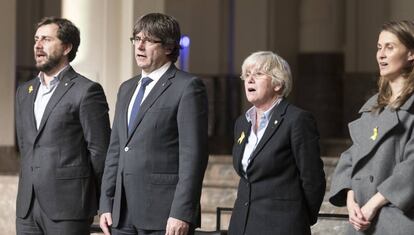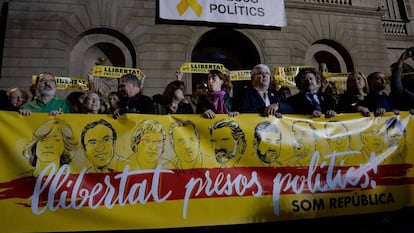Ousted Catalan premier seeks united separatist front for December election
But other pro-independence parties seem disinclined to join the PDeCAT in a joint run

The party of ousted Catalan premier Carles Puigdemont, the Catalan European Democratic Party (PDeCAT), has agreed to delay a meeting to approve the list of candidates who will run in the regional elections scheduled for December 21.
The move reflects the divisions within the Catalan independence movement with regard to an early election that was called by Spanish Prime Minister Mariano Rajoy using emergency powers under Article 155 of the Constitution. Rajoy has said the election seeks to restore legality in the region, so that the emergency powers can be lifted and normal relations re-established between Madrid and Barcelona.
Jordi Sànchez of ANC has already had four cellmates
Puigdemont, who fled to Brussels in early November with four aides after failing to appear in court to answer charges of rebellion and sedition, wants a united ticket of all separatist forces to contest the election.
But this seems unlikely, as other separatist parties have either expressed a desire to run separately or may even not run at all. The PDeCAT has already decided that Puigdemont will be their top contender, and agreed to push the party meeting to Thursday, a day before the deadline to file candidate names ahead of the campaign race.
The former premier has been pushing his idea for a united ticket through a website that has so far attracted 427,000 signatures of support.
We still believe that the unity of the secessionist world at the next elections is necessary
But the Catalan Republican Left (ERC), the party that has governed Catalonia in coalition with PDeCAT under the umbrella name Junts pel Si since the 2015 election, has shown little inclination to revisit the partnership.
Polls show that the ERC, once a minority party in the region, could now win the election if it runs on its own. Its leader Oriol Junqueras, who served as deputy premier until his removal by the central government, is currently in pre-trial custody in a Madrid prison on charges of rebellion, sedition and misuse of public funds in connection with the independence push.
The ERC has already filed a coalition named ERC-Catalunya Sí, which includes two new groups that broke away from the Catalan Socialist Party (PSC). Meanwhile, the far-left CUP party, which has provided Junts pel Sí with legislative support inside the regional parliament, is considering several scenarios, which include sitting out this election or contesting it within a leftist front.
But a coalition with PDeCAT seems improbable, as the CUP already rejected that option in 2015 on the grounds that this party, formerly known as Convergència, is too associated with cases of political corruption in the region.
Sources within PDeCAT said that Puigdemont’s plan sounds good, but may not be possible due to the party’s economic situation.
“We still believe that the unity of the secessionist world at the next elections is necessary, and we are ready to explore any possibility in order to make that possible,” said Marta Pascal, the party coordinator.
Life behind bars

The eight former Catalan government members and two grassroots activists who are being held in pre-trial custody at three Madrid penitentiaries are being flooded with letters of support from sympathizers. Most of the mail is being sent from Catalonia, where pro-independence groups have launched letter-writing campaigns.
So far, former deputy premier Oriol Junqueras is the only one of the group to not have received any family visits. “There are inmates who would rather not have their relatives come, to spare them the unpleasantness of having to go through checkpoints and seeing them through a glass partition,” said prison sources.
Only one out of the 10 has had any issues with fellow inmates, added the same sources. Jordi Sànchez, head of the pro-independence civil group ANC, has already had four cellmates. The first one, a businessman from Asturias, was a smoker, and Sánchez asked to be transferred to a non-smoking cell. His second cellmate was a Peruvian who reportedly complained that he was “sick and tired of Sánchez’s pro-independence tirades.” The third was “a Catalan man who also began to express unease. But he did not ask for a transfer because he had a medical problem and had to be hospitalized,” said the source. Sànchez is currently sharing a cell with another Peruvian inmate.
English version by Susana Urra.
Tu suscripción se está usando en otro dispositivo
¿Quieres añadir otro usuario a tu suscripción?
Si continúas leyendo en este dispositivo, no se podrá leer en el otro.
FlechaTu suscripción se está usando en otro dispositivo y solo puedes acceder a EL PAÍS desde un dispositivo a la vez.
Si quieres compartir tu cuenta, cambia tu suscripción a la modalidad Premium, así podrás añadir otro usuario. Cada uno accederá con su propia cuenta de email, lo que os permitirá personalizar vuestra experiencia en EL PAÍS.
¿Tienes una suscripción de empresa? Accede aquí para contratar más cuentas.
En el caso de no saber quién está usando tu cuenta, te recomendamos cambiar tu contraseña aquí.
Si decides continuar compartiendo tu cuenta, este mensaje se mostrará en tu dispositivo y en el de la otra persona que está usando tu cuenta de forma indefinida, afectando a tu experiencia de lectura. Puedes consultar aquí los términos y condiciones de la suscripción digital.








































